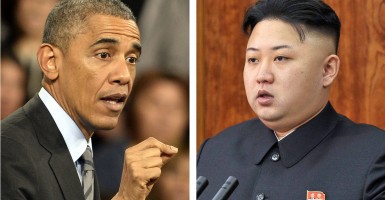President Obama issued a new executive order to impose addition punitive measures on North Korea. Although the cyberattack on Sony Pictures and subsequent threats of violence against theaters was the catalyst, the executive order also highlighted ongoing North Korean violations of United Nations nuclear and missile resolutions and Pyongyang’s extensive human rights violations. The new executive order included adding some new North Korean entities to the sanctions list.
Contrary to a widespread misperception, North Korea is not the most heavily sanctioned country in the world. The U.S. has implemented existing U.S. laws more firmly against other nations, including Iran, Burma, Syria and Zimbabwe for far less egregious violations.
Targeted financial measures have significant impacts on even the most reclusive regime or terrorist group since 95 percent of all international transactions are denominated in dollars and therefore must pass through U.S. Treasury-controlled banks in the United States, giving Washington tremendous leverage.
As the Heritage Foundation described in 2013, there are a number of other measures that the Obama administration should impose on North Korea. There are also a number of specific actions that Washington should take in response to the recent cyberattack, including returning North Korea to the state sponsors of terrorism list. The U.S. Congress should continue ongoing assessments of the need for additional legislation against North Korean violations of U.S. and international law. Congress should also review existing cyber legislation to ensure it fully protects U.S. public and private interests.
Pyongyang responds strongly to anything it considers an insult to its leadership, such as the movie “The Interview,” which depicts the death of Kim Jong Un, U.S. accusations that North Korea conducted the cyberattack on Sony followed by additional sanctions, and U.N. discussion of North Korean human rights violations.
Whether North Korea satisfies itself with only heightened rhetorical threats or resumes provocative action is always an open question on the Korean Peninsula. Pyongyang could conduct additional nuclear or missile tests — satellite imagery last year showed improvements at its missile launch facilities and preparatory work at the nuclear test site – or another tactical military attack on South Korea. Expect tensions to rise in the run-up to the annual U.S.-South Korean Key Resolve/Foal Eagle military exercises in March.
In a separate development, Kim Jong Un issued North Korea’s annual New Year’s Day speech, which is always scoured by the media for signals of regime intent to reform and moderate its provocative behavior. Passages that are less vituperative than the preceding year are hailed as harbingers of peaceful engagement. Media coverage of Pyongyang’s 2015 epistle is replete with headlines of Kim Jong Un advocating a summit with Seoul as part of a “big shift” in policy.
But context is critical in interpreting North Korean New Year’s Day communiqués — both in examining the entirety of the text and Pyongyang’s subsequent actions. Journalists inevitably cherry-pick positive-sounding passages but neglect surrounding passages that make all too clear the conditionality of North Korea’s offers. This year’s speech is no different, with Pyongyang demanding Washington and Seoul to make concessions to improve the atmosphere for diplomacy.
That said, the impression of a new North Korean desire for engagement can have impact by potentially reducing international efforts to punish North Korea for human rights and lead South Korean President Park Geun-hye to lower conditions for engaging the North. Park is facing increasing domestic criticism and pressure to achieve some progress in inter-Korean relations.
Seoul is hinting that it is more willing to reduce its own sanctions on North Korea at the same time Washington is increasing its sanctions. This could lead to strains between Seoul and Washington if the South Korean public perceives the U.S. as impeding inter-Korean relations.
The beginning of the year is always greeted with hope and trepidation on the Korean Peninsula. Kim Jong Un’s next moves remain unknown, but it seems that in 2015 – the Chinese zodiacal Year of the Sheep – North Korea will not be sheepish in pushing its demands.































